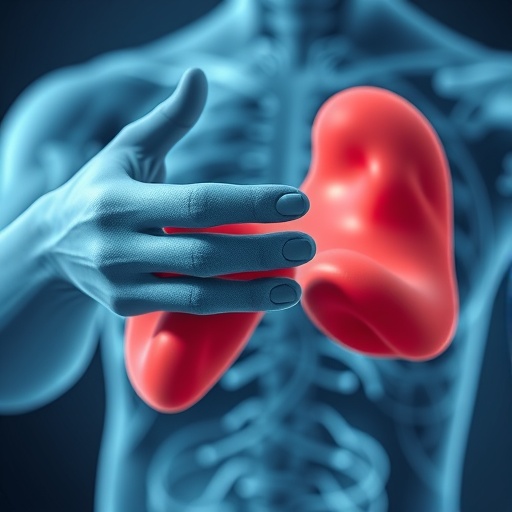In a groundbreaking study published in BMC Cancer, researchers have unveiled a significant link between the triglyceride-glucose (TyG) index and hypertension among adults diagnosed with cancer. This association sheds new light on the complex interplay between metabolic dysfunction and cardiovascular complications in oncological populations. The findings offer a promising biomarker to better predict and manage hypertension, one of the leading comorbidities exacerbating cancer patients’ overall prognosis.
Hypertension, a chronic condition characterized by elevated blood pressure, is a major risk factor for cardiovascular disease and mortality worldwide. Its development has been closely connected to insulin resistance (IR), a metabolic state where cells fail to respond properly to insulin, thereby impairing glucose regulation. Conventional methods of diagnosing IR are often invasive or costly, highlighting the need for alternative, accessible markers. The TyG index, calculated using routine fasting triglyceride and glucose levels, emerges as a convenient and reliable surrogate biomarker for assessing IR.
This comprehensive cross-sectional study leveraged data from the National Health and Nutrition Examination Survey (NHANES) spanning from 2005 to 2018. The cohort comprised 1,222 adults with a documented history of cancer. These subjects underwent thorough evaluation including demographic profiling, medical history assessment, lifestyle analysis, and laboratory testing, with a particular focus on the TyG index and blood pressure measurements.
.adsslot_5tWS2Fa9TR{ width:728px !important; height:90px !important; }
@media (max-width:1199px) { .adsslot_5tWS2Fa9TR{ width:468px !important; height:60px !important; } }
@media (max-width:767px) { .adsslot_5tWS2Fa9TR{ width:320px !important; height:50px !important; } }
ADVERTISEMENT
Notably, more than half of the participants—56.29%, or 775 individuals—were diagnosed with hypertension, underscoring the high prevalence of cardiovascular burden within this vulnerable group. The researchers employed multivariable logistic regression models to control for confounding factors, ensuring the robustness of the observed associations. The adjusted analyses revealed that for each incremental increase in the TyG index, the odds of hypertension development rose significantly.
Analyzing the TyG index as a continuous variable, the study found an odds ratio (OR) of 1.51 (95% CI: 1.09–2.11; p = 0.015), indicating a 51% increase in hypertension risk per unit rise in TyG. When categorizing the population into quartiles based on TyG values, a clear gradient in hypertension prevalence emerged. Participants in the highest TyG quartile exhibited an OR of 1.68 (95% CI: 1.09–2.84; p = 0.041) relative to the lowest quartile, highlighting a dose-response relationship.
Further stratified analyses dissected the data across various demographic and socioeconomic variables including age, sex, marital status, educational attainment, and family income levels. Intriguingly, none of these subgroup analyses revealed significant interaction effects, implying that the TyG-hypertension relationship persists consistently across diverse population segments. This homogeneity strengthens the argument for TyG’s utility as a universal risk indicator in cancer patients.
To characterize the nature of the TyG–hypertension association, the team utilized restricted cubic splines (RCS), an advanced statistical method allowing for the detection of potential nonlinear patterns. The spline analysis confirmed a predominantly linear relationship between TyG index values and hypertension prevalence, suggesting that incremental increases in TyG continuously elevate hypertension risk without plateauing or threshold effects.
The study’s findings herald significant clinical implications. Routine monitoring of the TyG index in adults with cancer could enable early identification of individuals at elevated hypertension risk, facilitating timely preventive interventions. Given hypertension’s well-established role in compromising cancer treatment outcomes and survival, integrating metabolic marker evaluation into oncological care paradigms may represent a vital step toward comprehensive patient management.
Moreover, these results invite further exploration into whether therapeutic strategies targeting insulin resistance might concomitantly ameliorate hypertensive sequelae among cancer patients. Lifestyle modifications, such as dietary optimization and physical activity, alongside pharmacological approaches addressing glucose and lipid abnormalities, could theoretically attenuate the TyG index and its associated cardiovascular risks.
It is important to acknowledge that the cross-sectional design of the NHANES dataset limits causal inference. Longitudinal studies are warranted to validate these associations prospectively and consider temporal dynamics between metabolic changes and hypertension onset. Additionally, dissecting cancer subtype-specific variations and treatment modalities could yield finer granularity in understanding these complex interactions.
Despite these limitations, the research breaks new ground by illuminating a novel, metabolic pathway linking insulin resistance and cardiovascular disease in an understudied population. Cancer survivors constitute an expanding demographic globally, often burdened by multiple co-morbidities that diminish quality of life. Identifying accessible risk markers such as the TyG index empowers clinicians to tailor interventions that address both oncological and cardiovascular health.
This study adds a critical piece to the intricate puzzle of cancer-related comorbidities, exemplifying how metabolic health parameters may serve dual roles in disease processes and prognostication. The TyG index, derived from inexpensive routine laboratory measures, offers a scalable approach for widespread clinical adoption and public health monitoring.
Future research directions may encompass exploring the molecular underpinnings connecting triglyceride-glucose dysregulation to vascular stiffness and hypertension pathophysiology in cancer settings. Integration of genetic, epigenetic, and metabolomic data could unravel personalized risk profiles, informing precision medicine approaches.
In conclusion, elevated TyG index levels correlate strongly and linearly with increased hypertension risk in adults afflicted with cancer, independent of demographic and socioeconomic factors. This discovery portends a promising avenue for improved cardiovascular risk stratification and underscores the imperative for metabolic evaluation in comprehensive cancer care frameworks.
As the oncology and cardiovascular research fields converge, multidimensional assessments incorporating biochemical markers like TyG could revolutionize both prediction and management strategies, ultimately enhancing survivorship trajectories and patient outcomes.
Subject of Research: Association between triglyceride-glucose index and hypertension in adults with cancer
Article Title: Association between triglyceride-glucose index and hypertension in adults with cancer from NHANES 2005–2018: a cross-sectional study
Article References:
Li, G., Zhang, D., Li, M. et al. Association between triglyceride-glucose index and hypertension in adults with cancer from NHANES 2005–2018: a cross-sectional study. BMC Cancer 25, 993 (2025). https://doi.org/10.1186/s12885-025-14398-0
Image Credits: Scienmag.com
DOI: https://doi.org/10.1186/s12885-025-14398-0
Tags: adult cancer patient health evaluationbiomarker for hypertension managementcancer comorbidities and mortalitycancer-related cardiovascular complicationscardiovascular disease risk factors in cancerchronic hypertension in oncologyinsulin resistance and cancer prognosismetabolic dysfunction in cancer patientsNHANES study on cancer and hypertensionnon-invasive methods for insulin resistance assessmenttriglyceride and glucose levels correlationtriglyceride-glucose index and hypertension





